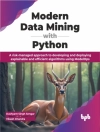Rules – the clearest, most explored and best understood form of knowledge representation – are particularly important for data mining, as they offer the best tradeoff between human and machine understandability. This book presents the fundamentals of rule learning as investigated in classical machine learning and modern data mining. It introduces a feature-based view, as a unifying framework for propositional and relational rule learning, thus bridging the gap between attribute-value learning and inductive logic programming, and providing complete coverage of most important elements of rule learning.The book can be used as a textbook for teaching machine learning, as well as a comprehensive reference to research in the field of inductive rule learning. As such, it targets students, researchers and developers of rule learning algorithms, presenting the fundamental rule learning concepts in sufficient breadth and depth to enable the reader to understand, develop and apply rule learning techniques to real-world data.
Tabella dei contenuti
Part I. Introduction to Rule Learning.- Machine Learning and Data Mining.- Propositional Rule Learning.- Relational Rule Learning.- Part II. Elements of Rule Learning.- Formal Framework for Rule Analysis.- Features.- Heuristics.- Pruning of Rules and Rule Sets.- Survey of Classification Rule Learning Systems Through the Analysis of Rule Learning Elements Used.- Part III. Selected Topics in Predictive Induction.- Part IV Selected Techniques and Applications.
Circa l’autore
Prof. Dr. Johannes Fürnkranz is a professor of knowledge engineering at the Technische Universität Darmstadt. He has chaired and served on the boards of the main journals and conferences in this field. His research interests include inductive rule learning, preference learning, game playing, web mining, and data mining in social science. Dr. Dragan Gamberger heads the Laboratory for Information Systems at the Rudjer Bošković Institute in Zagreb. He has chaired the main related conference ECML/PKDD, and is a coauthor of the publicly available Data Mining Server. His research interests include data mining and the medical applications of descriptive rule induction. Prof. Dr. Nada Lavrač heads the Department of Knowledge Technologies at the Jožef Stefan Institute in Ljubljana. She is the author and editor of several books and proceedings in the field of data mining and machine learning, and she has chaired or served on the boards of the main related journals and conferences. Her research interests include machine learning, data mining, and inductive logic programming, and related applications in medicine, public health, bioinformatics, and the management of virtual enterprises. In 1997 she was awarded the Ambassador of Science of Slovenia prize, and in 2007 she was elected as an ECCAI Fellow.












